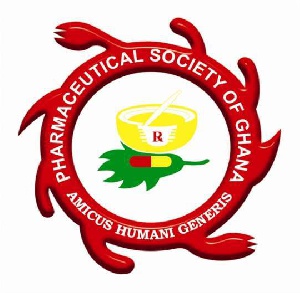Introduction
The Pharmaceutical Society of Ghana (PSGH) held its Annual General Meeting (AGM) from 24th to 27th September 2024, at the Kwame Nkrumah University of Science and Technology (KNUST), Kumasi. The event, which coincided with the World Pharmacists Day was under the theme; “Pharmacists- Meeting Primary Health Care Needs”.
Call To Action
Based on the discussions and resolutions at the AGM, the PSGH calls upon:
A. The Government of Ghana
1. To accelerate the integration of community pharmacies into the national primary health care system:
The PSGH calls on the Government of Ghana to expedite the formal integration of community pharmacies into the national primary healthcare system. With over 5,000 pharmacies nationwide, these facilities are well-positioned to serve as primary healthcare access points, especially in underserved areas. A “Pharmacy First policy” should be adopted, recognizing community pharmacies as the first port of call for minor illnesses.
This integration should include data capture and storage within the national health database, as well as involvement in public health interventions such as malaria control, HIV/AIDS management, and national immunization campaigns. Community pharmacies can also play a key role in screenings, early identification, linkages to care, and follow-ups for non-communicable diseases (NCDs).
Establishing a contractual framework with the National Health Insurance Authority (NHIA) to reimburse services provided by community pharmacies—currently covering only 150 out of 5,035 pharmacies—is essential to expanding access to pharmaceutical services and advancing Universal Health Coverage (UHC).
2. To address the shortage of Pharmacists in Public Sector hospitals:
The severe shortage of pharmacists in public health institutions, with no new hires since 2020, is a critical issue. Out of 51,000 healthcare professionals recruited in the last exercise, only 300 were pharmacists, undermining healthcare quality nationwide.
With a total workforce of less than 1000 pharmacists in public hospitals and institutions, the PSGH urges the government to immediately recruit at least 1,000 pharmacists to fill existing vacancies in already operating hospitals and improve conditions of service, especially in underserved regions, to ensure equitable access to pharmaceutical care across the country.
Furthermore, we call on the Government to uphold principles of fairness in the ongoing negotiations regarding the conditions of service for public sector pharmacists, ensuring that compensation accurately reflects the critical contributions pharmacists make to the healthcare system.
3. To address Pharmacy house officers' compensation and posting delays:
Delays in financial clearance and postings for pharmacy house officers continue to demoralize early-career pharmacists. We call on the Government of Ghana to pay the 2022 pharmacists who have completed their compulsory 12-month housemanship some months ago. In future, we propose a collaborative committee, involving the PSGH, Ministry of Health, Pharmacy Council, and Ministry of Finance, to ensure timely postings and payment for pharmacy house officers.
4. To review policy on Over-the-Counter Medicine Shops (OTMCS):
The PSGH calls for a policy review concerning Over-the-Counter Medicine Shops, particularly in urban and suburban areas. Upgrading these facilities to functioning pharmacies will enhance access to professional pharmaceutical care in communities across the country.
5. To take decisive action against galamsey:
Illegal and irresponsible mining poses a severe threat to public health and Ghana’s pharmaceutical industry by polluting water sources, increasing the cost of medicine production, and jeopardizing local drug manufacturing, including essential infusions. The PSGH urges the Government to take decisive action to end galamsey, protect water resources, and ensure the sustainability of local pharmaceutical production, which is vital for affordable and accessible primary healthcare.
B. The General Public
The public is encouraged to engage with pharmacists for expert advice on medication and all health-related concerns. Whenever you visit a pharmacy, ask to speak with the pharmacist, as they are committed to providing personalized, patient-centered care.
C. Media, Civil Society Organizations, and other professional bodies
The PSGH calls on the media, Civil Society Organizations (CSOs)and other professional bodies to support its advocacy for the integration of community pharmacies into Ghana's primary healthcare architecture. This integration has the potential to contribute to Universal Health Coverage (UHC) by increasing access to primary healthcare, reducing the pressure on hospitals, and easing the financial burden on the National Health Insurance Scheme (NHIS).
Additionally, the PSGH urges the media and CSOs to continue their efforts to end galamsey, which threatens the health of the public and the environment. We join these efforts and call on stakeholders not to relent in their advocacy to end galamsey and protect our natural resources, ensuring a healthier future for all.
D. Message to Pharmacists of Ghana
In our push for the integration of community pharmacies into the primary healthcare system, we must also prioritize our health amidst the rising prevalence of non-communicable diseases (NCDs). To support this, we have launched the PHARMILY STEPS INITIATIVE, a voluntary physical activity program designed to promote health and well-being while fostering unity within the profession. Together, we can enhance our contributions to healthcare and improve the health of our communities.
Conclusion
The PSGH reaffirms its commitment to safeguarding the health of Ghanaians through the integration of community pharmacies into the healthcare system. We urge all stakeholders—government, the public, the media, and civil society organizations—to support this initiative. By working together, we can strengthen our healthcare system, improve access to essential services, and ensure a healthier future for all. Additionally, we urge all stakeholders to support the fight against irresponsible mining as this threatens the pharmaceutical sector as well as the health of Ghanaians.
Health News of Saturday, 5 October 2024
Source: Pharmaceutical Society of Ghana

















